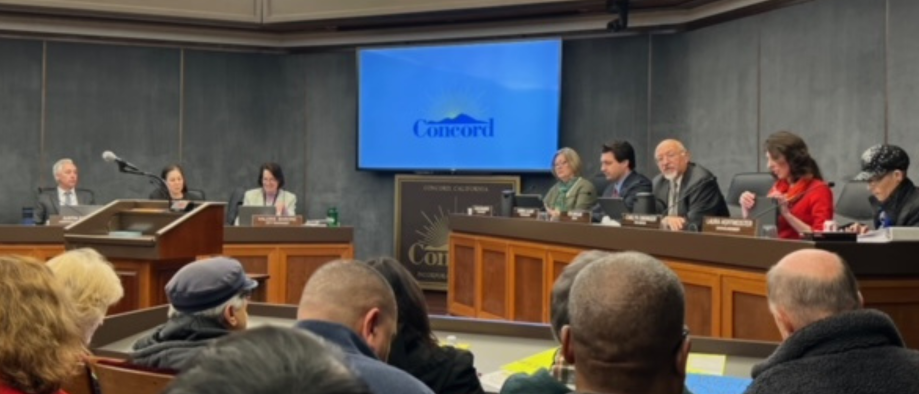Concord Council Forces Through Rent Control and Just Cause Ordinance

The Concord City Council convened on Tuesday night, Feb. 13 (after multiple continuations) to force through a new ordinance aimed at establishing rent control and just cause for eviction policies. The apparent goal was to solve the problem of providing more affordable housing and reduce evictions. However, Concord has some of the lowest average rents in the East Bay, and county records show that only 0.001% of renters were evicted last year. The real problem in Concord is the lack of housing, yet none of these “solutions”, that the council has spent months on, help resolve that issue. In fact, these new ordinances accomplish the opposite effect. The proposed laws, which will go into effect on April 5th, 2024, sparked significant community opposition in Concord, underwent prolonged discussions, and had few modifications during the lengthy council meeting that lasted until 11:45 pm
One of the primary points of contention was the inclusion of single-family homes in the just cause for eviction provisions. Under the proposed ordinance, owners of single-family homes would be required to pay up to $15,000 in relocation fees to a renter if they wished to reclaim their property or have a family member move in. This provision drew heavy criticism over the past few weeks from single-family homeowners as they gradually became aware of the council’s proposal.
Throughout the meeting, it became apparent that several council members had faced significant pushback from the community leading up to this meeting, particularly regarding the just cause provision for single-family homes. This pushback is what likely prompted Councilmember Obinger, at the top of the meeting, to propose putting this ordinance on the ballot for voters to decide. However, her proposal was met with legal constraints from the city attorney, as the council could not vote on putting anything on the ballot that night. An action like that would have to be placed on a future agenda.

Mayor Birsan's apparent desire to expedite the process tabled the single-family piece in order to push forward with discussions on other elements of the ordinance. His efforts to fast-track things faced challenges as the complexity of the proposed ordinance led to confusion among council members and prolonged deliberations.
Council members Obinger and Hoffmeister tried to raise the rent control cap, which limits annual rent increases to 60% of the Consumer Price Index (CPI) or 3%, but were unsuccessful in moving Birsan, Nakamura, and Aliano on that issue, and it remained intact. However, non-profit housing organizations that own 16 properties in Concord, were given a special exception with a 5% cap, citing the need for additional funds to operate. This begs the question as to how the council expects private rental owners to operate in the black without this special exception?
In one area of compromise, rental owners facing major insurance increases or forced to undertake significant capital improvements due to a new CA state law regarding balcony safety will be allowed to request rent increases beyond the 3% cap. These requests will be subject to approval by the rent board, providing some relief to property owners facing financial burdens.
Eventually, the topic regarding just cause for eviction returned, and slight adjustments were made to address concerns about the relocation costs to the removal of renters from single-family homes without cause. Under the revised ordinance, new residents moving into the property must reside there for a minimum of two years to avoid penalties imposed by the rent board. The renter being displaced will receive 2 months' rent and $2000 in relocation costs. This was a significant reduction from the originally proposed formula that could climb as high as $15,000 for relocation.
Despite the contentious nature of the discussions, the council passed the ordinance with modifications on a vote of 4-1. Council Member Hoffmeister was the lone dissenter. However, the entire council agreed to reevaluate the ordinance annually to monitor its effectiveness and address any unintended consequences.
Ultimately, this meeting underscored the complexity and sensitivity of rental housing policies, highlighting the need for continued community engagement and careful consideration of diverse perspectives. As Concord moves forward with these new regulations, stakeholders on all sides must remain vigilant, ensuring that the interests of renters and property owners are adequately balanced. It takes industry experience to consult on these issues from the beginning to develop solutions that actually solve the problems for legislators and create more rental housing.
